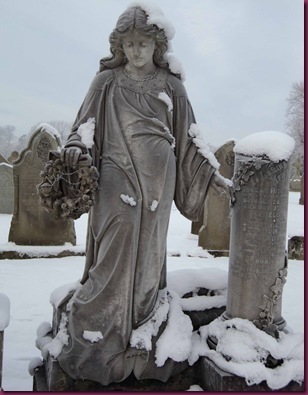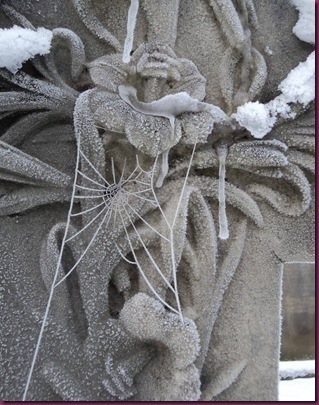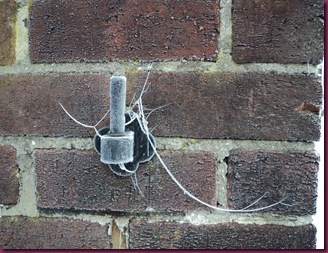Jane Eagland's Blog, page 6
March 25, 2011
Another Cheer!
I was very chuffed indeed to learn that Wildthorn has reached the finals of the Lambda Awards.
These American Awards, also known as the 'Lammys' are given annually by the Lambda Literary Foundation to books which celebrate or explore LGBT themes. This year the ceremony takes place on May 26th in New York but alas, I won't be there.
Part of me regrets this. Since the invitation refers to a 'pre-ceremony cocktail reception' and 'star-studded after-party', I'm imagining an exciting, glitzy occasion (somewhat like the Oscars…?). I've never attended such an event and I'm sure it would be fascinating. And I'm particularly sorry not to see Val McDermid and the legendary Edward Albee receive special Pioneer Awards.
But…but….
It's a long way to New York from here. And having been to the States for the first time last year and spent the first three days in a fog of jet-lag, I know there's no question of 'popping over The Pond ' and being in any state to cope with anything, let alone a party. And then there's the dreaded question of What to Wear. Given the nature of the occasion, I'm sure it will be a case of 'anything goes', but if I think about it….no. No. It can't be done. What a timid chicken.
But I like to think that in some sense Wildthorn will be there in my place. And I'm sure Eliza, if not Louisa, wouldn't be fazed by it at all.
Another Cheer! is a post from: Jane Eagland
©2011 Jane Eagland. All Rights Reserved.
.








March 11, 2011
3 Cheers!
Three spiffing bits of news have come my way recently.
A flash fiction of mine has been accepted by Flax Publications , the publishing imprint of Litfest, for an anthology due to be launched in June. I have a soft spot for Flax since I had a story published in their very first anthology, Square Cuts. Since then the number of their publications has grown to an impressive list, well worth checking out.
Secondly, I've been invited to be the writer for a project taking place in Colne library – I'm not exactly sure what's involved yet, but I know I'll be visiting the library in May, talking to people, exploring the building and then hopefully writing something that will be displayed in the library, together with some art work. I've never done anything like this before so it's exciting and a little bit scarey.
Finally, the news that has been short-listed for the Lancashire Book of the Year Award is very cheering indeed. I am particularly pleased because the books are voted for by young readers themselves. There will be some jollifications relating to this later in the year.
I'll be writing more about all these things in due course. Watch this space!









March 2, 2011
A Trip to Chorley & Some Thoughts about Self-editing
Last week I was invited to speak to Chorley & District Writers Circle, a friendly group who meet on the last Tuesday of every month at the Hartwood Hotel in Chorley.
I was glad to discover that the hotel is conveniently located just off the M61, but be warned – if you're coming from the motorway you have to negotiate a roundabout with a tricky set of lights. I managed this and then found myself in the wrong lane about to sail past my destination. (Apologies to the driver I cut across and to the people outside the hotel trying to have a quiet chat on their mobiles as I whizzed into the car park at an alarming speed.)
After that the evening went swimmingly as far as I was concerned, though I'm not sure the writers had the experience they were hoping for. I'd been asked to speak about my experiences of being published…the group did manage to ask a few questions and we had some laughs, but of course I got carried away. As a result, there wasn't much time left to talk about editing novels which was the other subject the group wanted to discuss.
A commendable number of the members had novels underway or completed. In a busy life finding the time, energy and commitment to write anything can be difficult so I was impressed. I was delighted to be introduced to the concept of the 'sleeping' novel ie one that you've started but are not currently working on. A familiar experience for many of us, I imagine! But rather than feeling guilty about it, how nice to think of it resting and waiting to be woken up (like Sleeping Beauty).
To introduce the topic of revision I quoted Kurt Vonnegut's comforting words:
This is what I find encouraging about the writing trades: They allow mediocre people who are patient and industrious to revise their stupidity, to edit themselves into something like intelligence .
Of course I hastened to make it clear that I was including myself among the 'mediocre'; I'm certainly not one of those lucky people who can produce a stream of deathless prose at the first attempt.
I talked about macro-revision: looking at the structure of your novel with a chapter by chapter summary to highlight the narrative arc; checking the characters for consistency and depth. Here another quotation from Kurt Vonnegut seemed to strike a chord:
Every character should want something, even if it is only a glass of water.
I take this to mean not that you have to explore the motivation of all your characters even the minor ones, but that an awareness on the writer's part of what all the main characters want will help to enrich every scene. And even minor character can be individualized : the waiter desperate for his shift to end will serve the meal in a different way from the waiter eager to impress his boss.
We soon ran out of time, alas, and I had to leave the group with the handout I'd prepared showing the revisions a paragraph of went through. If you're interested, you can see it here.
It demonstrates what I believe is the main way to improve your work at the micro-level: cuts, as we know all too well, are often unwelcome, but when it comes to writing they are a Very Good Thing.









March 1, 2011
Whisper My Name page 52 Successive versions of a section to show editing
1. And I must stop dwelling on my disappointment about India. What was the point of being miserable? I must put it out of my mind and make the most of this brief spell of freedom.
It worked. I started to relax. It was fun to rush along the Broad Walk for the sheer pleasure of being out in the crisp autumn air or dawdle if something caught my attention, like the fat tabby cat sunning itself on a step. Much more fun than marching along with Miss Tobitt, having a stilted conversation in French.
2. And for now I must try to forget about India. What was the point of being miserable? I must make the most of my unfamiliar freedom.
It worked up to a point. Deep inside I still felt raw, but I tried to focus on my surroundings and the bright day helped to lift my spirits.
It was fun to rush along the Broad Walk for the sheer pleasure of being out in the crisp autumn air or dawdle if something caught my attention, like the fat tabby cat sunning itself on a step. Much more fun than walking sedately with Miss Tobitt, having a stilted conversation in French.
3. And for now I must try to forget about India. When I was a child, if I was upset Papa used to say: stop, look, see how beautiful the world is. Why be miserable?
It worked up to a point. Deep inside I still felt raw, but I focused on my surroundings – somewhere someone was burning weeds, blue smoke drifting in the air; not far off a barrel-organ was playing; a fat tabby cat was sunning itself on a step – it all helped to lift my spirits.
It was fun to rush along the Broad Walk for the sheer pleasure of being out in the bright autumn day or dawdle watching the children kicking up crisp leaves. Much more fun than walking sedately with Miss Tippins, having a stilted conversation in French.
4. It was a beautiful day, as bright as any in India at this time of year, but with a crisp chill in the air that was bracing. Somewhere someone was burning weeds, the blue smoke drifting in the air, a different smell from the dung fires of the bazaar; not far off a barrel-organ was playing; a fat tabby cat was sunning itself on a step…my spirits rose.
It was fun to rush along the Broad Walk for the sheer pleasure of being out in the bright autumn day or to dawdle watching the children kicking up crisp leaves. Much more fun than walking sedately with Tippy, having a stilted conversation in French.
In the first three versions you can see I'm trying to remind the reader of what's just happened, but it's all rather heavy-handed. And actually it's more convincing that Meriel, who is rather mercurial, would get over her upset quickly, at least temporarily, so I've cut that part in version 4.
I tend to under-write in earlier drafts and you can see me adding more sensory detail as I go on.
Notice also how the governess's name changes – I was searching for a name that could be shortened to an affectionate nickname and 'Tippy' seems to suit her character better.
Final Version – after editor's cuts:
It was a beautiful day with a crisp chill in the air that was bracing. Somewhere someone was burning weeds, the blue smoke drifting in the air; not far off a barrel-organ was playing; a fat tabby cat was sunning itself on a step. My spirits rose.
It was fun to rush along the Broad Walk for the sheer pleasure of being out and about or to dawdle watching the children kicking up crisp leaves. Much more fun than walking sedately with Tippy, having a stilted conversation in French.
The reference to India has gone! Partly because I was reminding the reader of India too much – it wasn't convincing that Meriel would be thinking about it so much after four years. And also in the interests of pace.









February 12, 2011
Not-Writing 2
January. After Janus, the Roman god of gates and doors. The beginning of the year, a door opening to new possibilities. But for me it felt as if a door closed.
Outside, a bleak absence of colour.
And inside, not-writing-because-I-am-having-a-holiday-and-enjoying-myself-doing-other-things slipped imperceptibly into that dreaded state of not-writing-because-I-can't.
Not even this blog.
I don't know whether this experience is what people call 'writer's block'. That doesn't feel quite the right word to me – it makes me think of a huge block of stone – something 'out there' and inert.
Whereas this is all internal and it feels like wrestling with something slippery and alive, a writhing serpent compounded of loss of confidence, a sense of failure, despair. I can't gain access to my inner creative space: this ugly serpents squats at the entrance.
It doesn't just prevent me from writing; its seeping poison alienates me from every area associated with writing. If I'm invited to teach or speak to writing groups, I feel a fraud. I can't read or respond to the blogs of other writers who are functioning happily. It's like being struck down by an illness, cast out from normal life. I'm afraid that I'll be stuck like this and the horrible question looms: well, if I'm not going to write, what am I going to do?
In an effort to struggle out of the serpent's coils I try various things:
I give myself a good talking to: Stop being so self-pitying. The world doesn't need any more books from you. Think of others suffering far worse afflictions: people losing their jobs, living in oppressive political regimes, starving… This doesn't cheer me up.
I plan a holiday, trips out, activities designed to distract me. I try retail therapy, focusing on purchases that need a lot of research: what is the best kettle, the best TV available at the moment. This is good. This fills a lot of time. But there are only so many things one can buy. And I know really that all this is running away.
I turn to sources of help. When I first started writing seriously I armed myself with The Writer's Survival Guide by Rachel Simon, now sadly out of print, but available online here. Rachel Simon is perceptive about the states of mind, both positive and negative, that a writer may experience. I look up Feelings of Failure; Insecurity; Shame. I recognise myself. I read the chapter called The General Antidotes. It helps.
Things I read by chance snag my attention: a biography of Tennyson describes the adversity he suffered early in his career: poverty; the death of his friend Hallam; fear of inherited madness; damning reviews. Throughout it all, he continued to write.
I find myself wanting to read poetry. I enrol on a poetry writing course with Helen Farish, not because I intend to change direction – I'm no poet – but so that I can spend a day writing, without pressure, no-strings-attached.
I start to feel better. I can read blogs again and on the splendid FictionBitch come across Sue Gee's post on Writing. What she says about the deep appeal of writing chimes with me.
Yes, I think. I want that 'secret life'.
I write this post. Outside, snowdrops, crocuses, puschkinia appear.
Inside, the serpent has gone. Doors are opening. Something new is arriving.









December 30, 2010
Not-Writing
Always strange, I feel, this period between Christmas Eve and New Year's day, when everyone seems to retreat into their homes and normal life is on hold. Amid a few bursts of seasonal sociability, I've had time in which I could have been Getting On (with the next novel). But it's hard to resist the feeling that it's 'the holidays, or at least, that's my excuse, and so I haven't.
Instead I've been: sorting recipes. Going through a file bulging with greasy plastic wallets stuffed full of cuttings could be seen as a tedious and not very creative task. But a ruthless cull of recipes for things I've never tried and no longer want to cook or eat has been satisfying. And here and there are treasures: old favourites I've forgotten about, like Harvester's Crumble and Queen of Puddings. And some recipes, especially the hand-written ones, bring back memories… Aunt Heather's rusks: and immediately I'm back in her small front parlour, under her watchful eye, enjoying the sharp taste of cheddar and trying not to make crumbs. A much-stained recipe for mince pies evokes the shared Christmas ritual with Mum, her careful spooning in the heaps of mincemeat the only 'cooking' she ever did in the end.
I've also been: planning an extension. Every now and then the frustration of not having enough space, of having to manhandle mattresses down stairs if someone comes to stay, of wanting somewhere to put a fridge-freezer, drives me to come up with schemes, all of which have foundered on some unforeseen obstacle. But I've been measuring everything obsessively and drawing scale plans and this time I think I may have cracked it. And the beauty of my latest plan is that it gives me what I've long wanted: a room overlooking the garden and beyond that, the fields and fells: a room with a view, to write in.
And inspired by the frost I've been: slow looking. That is focusing on small details and really looking properly. Here are some of the results:
Conjuring memories; creating rooms that didn't exist before; intent observation.
Actually not-writing has turned out to be rather like writing, after all.









December 22, 2010
The Writer's Life 2
I had it in mind to write a post yesterday about it being the winter solstice. I was going to quote John Donne's poem, A Nocturnal Upon St. Lucy's Day, Being the Shortest Day:
The worlds whole sap is sunk:
The general balm th'hydroptic earth hath drunk,
Whither, as to the bed's-feet, life is shrunk,
Dead and interr'd…
( In case anyone's puzzled, 'hydroptic' means thirsty. )
What with the arctic weather and long, dark evenings and friends in hospital or falling and breaking limbs, I've been feeling recently that life has indeed shrunk to the foot of the bed. I thought writing about it might cheer me up. But it was not to be.
I woke to darkness, stumbled to the bathroom, turned on the tap…nothing.
Not a drop of water, neither hot not cold. Nor, alas, any in the toilet cistern. The water appeared to have been drunk by the thirsty earth but I assumed it had in fact frozen in the night's sub-zero temperatures.
Luckily there was cold water downstairs so washing was possible using a kettle, and buckets of water dealt with the loo. And even more luckily the heating's on a separate system so the house was warm. But I needed to set about thawing the pipes. Trouble is, I don't know where they are…
I spent a while in the garage (temperature minus 2) waving a hairdryer at some likely-looking pipe-work. Then I felt under the lagging and realized I was trying to warm up the hot pipes to the radiators.
I made a foray to the shops to buy a heater for the garage. First attempt – sold out. Second attempt – success. This shop had also mended the hoover (see The Writer's Life 1) which was ready to be picked up. For a moment things were looking up.
But then I discovered all the car doors were frozen apart from the driver's door – and it was a large heater. It was possible to have it delivered, but not until today. I drove about on the ice for a while until the doors came unstuck, went back for the appliances, managed to get them home. By now it was time for lunch.
I spent the afternoon fiddling about trying to fit the castors without which the heater wouldn't operate following a diagram that made no sense at all. Eventually I succeeded.
By now it was time to make a trifle – friends coming for a pre-Christmas get-together. Unfortunately the raspberries I heated gently to make some juice burnt in the pan. The custard, despite my continuous stirring, went lumpy…
And so the day passed.
Today I have at least managed to write this. The pipes have not, as yet, thawed out and I am fearing they might have burst, which I shall no doubt find out when the temperature rises.
Three final points. Owing to a change in the calendar, the feast of St. Lucy (whose name, of course, means 'light') no longer falls on the shortest day as it did when John Donne wrote his poem.
Yesterday I learnt that it is impossible to sieve custard. But the trifle wasn't half bad – witness the small amount that was left:
And a small consolation: now that the solstice has passed the days are getting longer again. Hooray!









December 16, 2010
A Meeting of Minds
Here's an interesting conversation it's worth dropping in on – two writers I happen Propecia whithout prescription to admire: Jenn Ashworth, novelist, interviewing Sarah Hymas, poet.









December 6, 2010
Talking the Talk
Recently at a Reading Group discussion of , I was asked how I approached the dialogue, given that the novel is set in 1885. This is a good question.
I've read some novels set in the past where people use modern colloquialisms and it jars – on me, anyway. I've also read novels set in later nineteenth century where everyone speaks very formally: 'Would you care to partake of some refreshment?' This makes me uneasy too: I imagine some people may well have spoken like that, but I can't believe everyone did even among the educated classes.
But if you aim to make dialogue authentic the first difficulty is knowing how people spoke in the past – we have the literature and also letters and diaries, but these are all written forms and writing and speech are very different. Also they are the products of literate people and therefore fail to represent everyone.
The second difficulty is that the further back in history you go, the less familiar language becomes, so if you pursue accuracy, it can make the dialogue hard to follow.
Since my novels aren't set too far in the past, I don't have to worry too much about readers finding the dialogue accessible. To help me make it seem convincing, I look at the speech in nineteenth century novels. I realize that this may still be only an approximation of how people actually spoke, but since it's probably where most modern readers get their ideas of what a Victorian might have sounded like, it seems useful as a rough guide.
Here is an extract from Demos by George Gissing, written in 1886.
'I did so want you to come!' she exclaimed. 'Tell me about Adela.'
'I don't know that there's anything to tell,' was Alfred's stolid reply. 'It's settled, that's all. I suppose it's all right.'
'But you speak as if you thought it mightn't be, Alfred?'
'Didn't know that I did. Well, I haven't seen her since I got home. She's upstairs.'
To me this was surprisingly modern and less formal than one might expect.
In I particularly wanted Meriel, a rebellious teenager, to speak colloquially so I used slang, imagining that she had picked it up from the maid, Sally.
At the editing stage some of my phrasing was queried Cialis pill whithout prescription as sounding too modern. But I had checked it where possible, either in novels or Eric Partridge's Dictionary of Historical Slang – an invaluable tool for the historical novelist, so I was pretty confident about my usage.
In case you're interested, here are some examples:
'By jingo' in use from 18th century; appears in Gissing, Conan Doyle
'cheek' used from 1830, appears in Dickens
'went berserk' in use from 1867
'racked my brains' appears in Wilkie Collins, Gissing
'got on my nerves' in use from 1870
Some might say this degree of seeking after accuracy borders on the obsessional but it matters to me to get it right as far as I can.
But is it really so important? What do you think?









November 28, 2010
Serendipity in the Dark
I'm working on a new novel. Not writing yet, but still in the midst of that pre-writing stage I love, which is a combination of research and dreaming the story into being. The process is akin to feeling my way round an unfamiliar room in the middle of the night, turning on lamps to create small pools of light, gradually discovering more of where I am.
Research, which for me is mainly reading books, helps in obvious ways: the dates by which various railway lines were in operation; the number of servants people could afford depending on their incomes – these are the historical facts it's important to me to get right. It's not so much that I'm afraid readers will pick me up if I get it wrong, but I need to feel I'm building my story on a firm foundation.
But research helps in less obvious ways too; while the shape of the novel is still fluid, what I read about real people or events or processes, can nudge my thinking in new directions, give me more ideas for the plot.
I discover a certain High Church family had their own Chaplain living in the grounds. Now there's a character I hadn't thought of who might have an important part to play…
I read about the pits used in the leather tanning industry where the hides were softened in a mixture of water and dog poo. Aha! That gives me an idea for something that might happen…
Apparently Horace Walpole coined the word serendipity in 1754 explaining that he formed it from the title of "a silly fairy tale, called The Three Princes of Serendip: as their highnesses traveled, they were always making discoveries, by accidents and sagacity, of things which they were not in quest of."
For me, this describes Generic pills whithout prescription the business of research exactly: going on an exciting journey, making unexpected discoveries, turning on more lights…









Jane Eagland's Blog
- Jane Eagland's profile
- 73 followers







